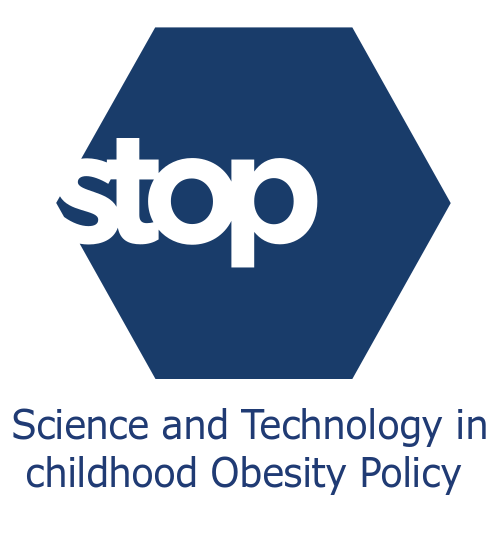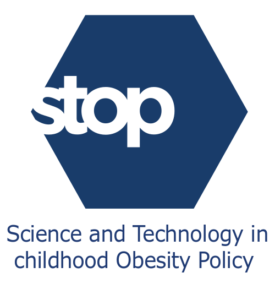Over the last four-and-a-half years, the STOP project has been undertaking research on the determinants of childhood obesity and the policies and interventions that are necessary to address its rising prevalence across Europe. STOP partners have generated a wide range of research and outputs, including on the determinants of childhood obesity, new measurement tools for childhood obesity, the effectiveness of nutrition, physical and primary health care interventions and the roles and views of different stakeholders. In addition, the project has generated new insights into government and business commitments to improve food environments and has produced a set of practical policy briefs in collaboration with WHO to help policymakers advance action.
To mark the end of the project, STOP project partners, other experts and stakeholders with an interest in childhood obesity came together for a 2-day conference held in Rome on 21st – 22nd November, to discuss the key findings and implications of the STOP project outputs for future research and policy priorities. The meeting agenda was highly interactive, with papers prepared in advance and a single scene-setter presentation delivered in each session to inform open discussion with all participants. Key topics covered in the programme included biomarker insights on the determinants of childhood obesity, fiscal policies, healthcare interventions, physical activity, modelling and social inequalities.
The conference opened with an introductory session titled ‘Childhood Obesity: Research for Policy’ by STOP project coordinator Franco Sassi (Imperial College London). This provided an overview of the key project outputs, setting the day for the proceedings.
The second session of the day gave further detail on ‘Research for Policy’ and was led by Nikolai Pushkarev (European Public Health Alliance). This session framed the discussions for the next few days, highlighting opportunities such as using Intergovernmental Panel on Climate Change (IPCC) type structures to bring together the evidence base and policy goals. It also highlighted the increasing importance of demonstrating a multi-disciplinary approach and considering co-benefits in research and policy design.
A series of research sessions then followed, starting with a presentation by Paolo Vineis, (Imperial College London) titled ‘Using Evidence from biomarkers to strengthen the childhood obesity policy agenda’. The presentation and following discussions emphasised the great potential for this area of research to inform policies and interventions in the future, once further research is undertaken to ascertain the causal nature of the pathways identified between exposures and childhood obesity. A good example is the role of highly industrially produced food as determinants of body weight and obesity. STOP research has identified some possible mechanisms underpinning that link, which will need to be further explored in a causal inference framework.
The next session, titled ‘Fiscal Incentives for changing dietary behaviours and promoting reformulation’, focused on fiscal policies, and was led by Olivier Allais (INRAE) and Franco Sassi (Imperial College London). The session compared the experiences of France and the UK, among others, to identify key lessons and factors that can contribute to effective fiscal policies. The findings suggest that there is scope for expansion and improvement of health taxes on food, and that fiscal policies can and should be part of a synergistic set of policies to tackle childhood obesity. There is a need for further research to better identify the effectiveness, cost benefits and optimal tax rate to further inform policy design. In addition, there were discussions about the unintended consequences (e.g. use of artificial sweeteners) and a call to ensure this is integrated into research on effectiveness and impact.
The focus then moved onto healthcare with a session titled ‘The role of primary care in addressing childhood obesity’, led by Paulina Nowicka (Karolinska Institute). The session built on the initial results of a STOP randomised controlled trial of a parent group intervention supported by a digital app to address obesity in young children, which showed the potential value of using healthcare settings and resources to support families of children living with obesity. Key takeaways related to the need for interventions to be socially sensitive to avoid stigma, for the involvement of patient organisations in the planning and delivery of interventions, and for ensuring that healthcare professionals are consistently trained in how to communicate with their patients. As part of the session, WHO presented a forthcoming WHO-STOP Policy Brief on addressing childhood obesity in healthcare settings, particularly in primary healthcare, and their work on the Acceleration Plan on Obesity.
Day two started with a session titled ‘Promoting physical activity in school settings for the prevention of childhood obesity’ by Maroje Soric (University Zagreb). This session looked at factors that affect active travel rates as well as the impact of different interventions to reduce sedentary behaviour, increase physical activity and increase physical fitness. In addition, early data on the impact of COVID-19 on sedentary behaviour and physical fitness amongst primary-school children was presented. The following discussion focused on the challenges of replicability and sustainability of interventions in schools, the need for better school-based surveillance, and the differences in intervention effectiveness between boys and girls.
The following session was led by Jack Olney (Imperial College London) titled ‘Computer-based modelling of childhood obesity polices challenges and value of policy’. Key points delivered were the different ways in which models can account for uncertainty in data and future events, how modelling results and their uncertainty can be most effectively communicated to different stakeholders, and the potential for modelling to inform the policy discourse and stakeholder interactions.
The final research session was titled ‘Tackling the socio-economic gradient in childhood obesity’ led by Tim Lobstein (World Obesity) and Francesco Branca (WHO). Social inequalities and inequity have been an important focus of the STOP project and has been integrated across the various workstreams. Data consistently show that obesity is related to inequalities and the gap is only widening. A number of themes emerged from the discussion, including the different ways that inequalities can be addressed in research, the inadequacy of data, the need to better understand what underpins inequalities and what the systemic failures are that need to be addressed. There was a general consensus that we will not address obesity and make the improvements to health that we want at the population level if we do not address inequalities.
Ending the conference was a session led by Hannah Brinsden (World Obesity), where the focus returned to the question of how research can be better designed to impact policy and what opportunities there are to bring academia and policymakers closer together. The discussions focused on the often contradictory notion that it is critical that there is a strong evidence base that can stand up to legal scrutiny, while at the same time recognising the politics that surround policy decisions. In addition, it was highlighted that the evidence is very strong and rarely disputed on the data and drivers of obesity, but that evidence is weaker in terms of certainty of impact which is ultimately what policymakers want to know. Key themes that emerged from the discussion focused on the need for better communication between stakeholders, including stakeholders, both for understanding how to support each other and how to frame research for policy. Discussions also challenged participants to use the lens of COVID-19 to better frame chronic disease as part of pandemic preparedness, and that equity needs to be integrated into all future research.
The meeting closed with a reminder of the wide range of findings and outputs of the STOP Project over the last four years, and a strong desire to continue collaborating and to take the research further to better inform policy and support healthier populations.
A full conference report and presentations will be made available in due course.

